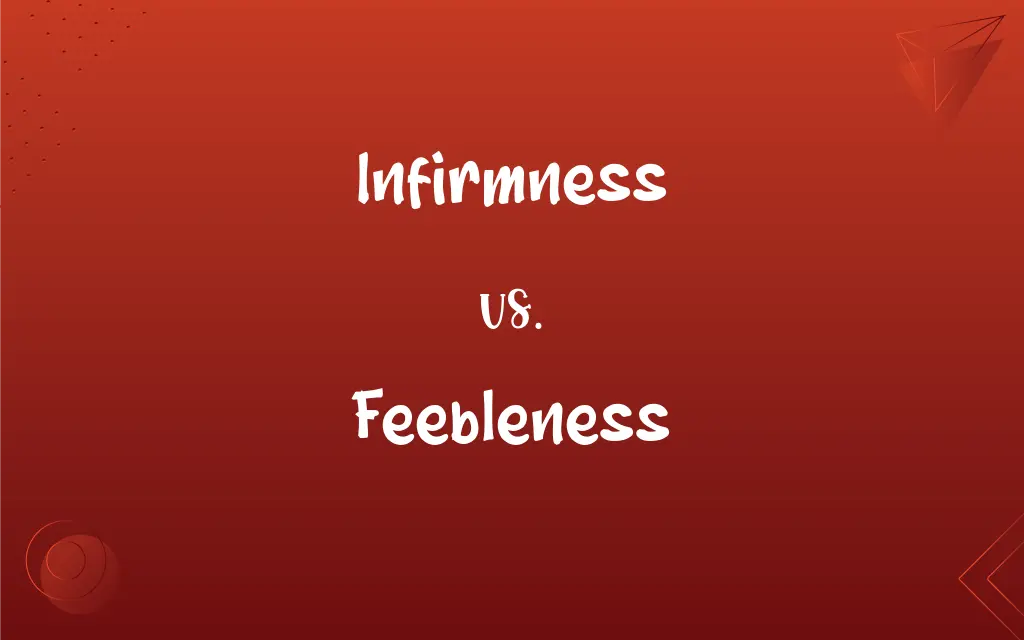Infirmness vs. Feebleness: What's the Difference?
By Janet White || Updated on November 10, 2023
"Infirmness" refers to physical or mental weakness, often due to age or illness, while "feebleness" denotes a lack of strength or vigor, either physically or in character.

Key Differences
"Infirmness" generally indicates a state of physical or mental weakness, typically resulting from old age or illness. In contrast, "feebleness" can refer to a broader range of weaknesses, including physical frailty, lack of intensity, or inadequacy in character or purpose.
Infirmness often conveys a sense of chronic or long-term weakness, particularly associated with the natural aging process. Feebleness, however, can describe temporary conditions of weakness or insufficiency in various contexts, not strictly limited to health or age.
The term "infirmness" is commonly used in medical or health-related contexts to describe conditions of debilitation. Feebleness, on the other hand, is often used more broadly to denote a lack of strength or effectiveness, be it in physical capacity, ideas, or actions.
Infirmness implies a certain level of vulnerability and the need for care or support. Feebleness, while also suggesting weakness, can extend to describe situations, efforts, or even arguments that lack force or persuasiveness.
Comparison Chart
Definition
Physical or mental weakness
Lack of strength or vigor
ADVERTISEMENT
Typical Context
Age, illness-related weakness
Physical frailty, weak efforts or ideas
Duration
Often chronic or long-term
Can be temporary or situational
Usage
Medical, health-related
Broader, including character or actions
Connotation
Vulnerability, need for care
Ineffectiveness, lack of intensity
Infirmness and Feebleness Definitions
Infirmness
Chronic frailty.
Infirmness prevented her from daily activities.
ADVERTISEMENT
Feebleness
Weakness in character.
His feebleness of character was his downfall.
Infirmness
Mental debility.
Infirmness of mind was evident in his forgetfulness.
Feebleness
Ineffectiveness.
The feebleness of their efforts was frustrating.
Infirmness
Physical weakness due to age.
His infirmness increased with age.
Feebleness
Lack of physical strength.
The feebleness in his arms made lifting difficult.
Infirmness
Vulnerability due to illness.
His infirmness was apparent after the surgery.
Feebleness
Lack of intensity.
There was a feebleness in his voice.
Infirmness
Need for care.
Her infirmness required specialized attention.
Feebleness
Insufficient force.
The feebleness of the argument was clear.
Infirmness
The quality of being infirm; feebleness or illness.
Feebleness
Lacking bodily strength; weak
Too feeble to climb the hill.
Infirmness
Infirmity; feebleness.
Feebleness
Having little intensity or strength; faint
Feeble light.
A feeble voice.
Feebleness
Having little capacity to withstand pressure or strain
The castle's feeble defenses.
Feebleness
Lacking vigor or effectiveness; inadequate
A feeble attempt to apologize.
Feebleness
Showing little activity
A feeble housing market.
Feebleness
The quality or state of being feeble; debility; infirmity.
Feebleness
The quality or condition of being feeble; debility; infirmity.
That shakes for age and feebleness.
Feebleness
The state of being weak in health or body (especially from old age)
Feebleness
The quality of lacking intensity or substance;
A shrill yet sweet tenuity of voice
FAQs
Is infirmness always due to aging?
Often, but not exclusively.
Can young people experience infirmness?
Yes, due to illness or disability.
Does infirmness imply a need for care?
Often, it suggests a need for support.
What does feebleness mean?
Lack of strength or vigor.
Can feebleness apply to non-physical aspects?
Yes, like character or ideas.
Does feebleness imply a lack of intensity?
Yes, in actions or expressions.
What is infirmness?
Weakness due to age or illness.
Can feebleness be temporary?
Yes, it can be situational.
Can feebleness describe efforts?
Yes, as in weak or ineffective efforts.
Can feebleness affect decision-making?
Yes, as in weak decision-making.
Are there treatments for infirmness?
Depends on the underlying cause.
Is feebleness always negative?
Often, but context matters.
Can exercise reduce infirmness?
Sometimes, to maintain strength.
Does infirmness affect mental health?
It can, especially in the elderly.
Can feebleness be overcome?
In some cases, with effort and support.
Is infirmness a medical term?
It's often used in health contexts.
Does feebleness impact daily life?
It can, especially physical feebleness.
Can feebleness be a character trait?
Yes, in terms of weak character.
Is infirmness always chronic?
Frequently, but it varies.
Is infirmness reversible?
Depends on the cause and health interventions.
About Author
Written by
Janet WhiteJanet White has been an esteemed writer and blogger for Difference Wiki. Holding a Master's degree in Science and Medical Journalism from the prestigious Boston University, she has consistently demonstrated her expertise and passion for her field. When she's not immersed in her work, Janet relishes her time exercising, delving into a good book, and cherishing moments with friends and family.































































